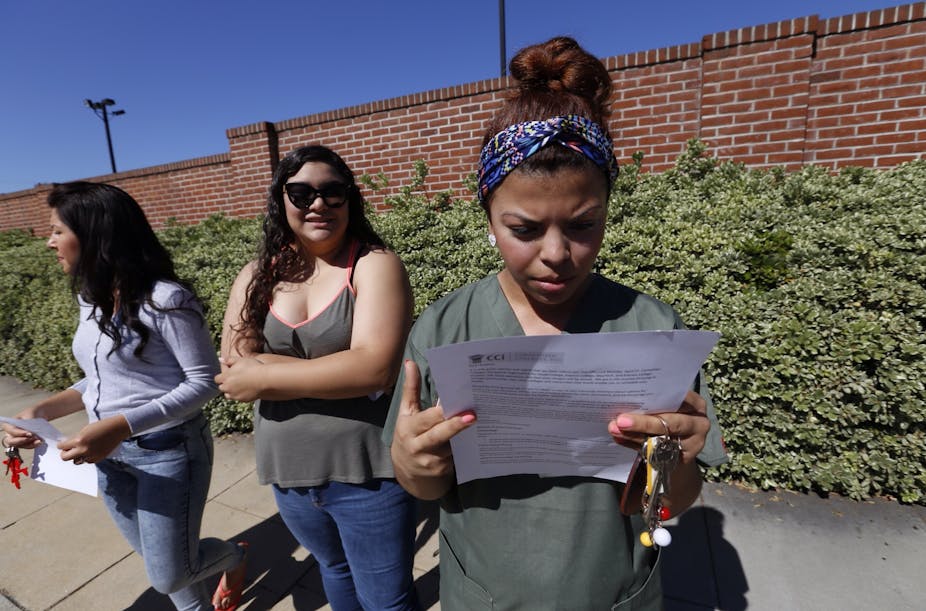During recessions or times of high unemployment, there tends to be an increase in the number of people who enroll in college.
Due to the economic fallout from COVID-19, it is expected many people are likely to return to college once again. Indeed, a survey from March found that one-third of American workers felt that if they lost their job because of COVID-19-related events, they would need additional education or training to get another job that pays the same. Asked if they had US$5,000 to spend on their future education or training, 26% of survey respondents said they would attend an online college or university.
If people rush to enroll in college during harsh economic times, they may not weigh whether they choose to apply to a for-profit institution or a more traditional nonprofit or public university. As scholars of higher education who have observed the ups and downs of for-profit colleges, we think that would be a big mistake.
As the term “for-profit” implies, these schools exist to make money for investors. A 2019 report found that relative to other postsecondary institutions, for-profit colleges spend the least on instruction – less than half of all the tuition they collect from students – and tend to spend heavily on marketing and advertising.
Public universities, on the other hand, often spend relatively more on instruction. So do many nonprofit private institutions. That matters because the more a school spends on instruction, research shows, the better its students tend to do in terms of getting full-time jobs and bigger salaries.
A history of deception
For-profit colleges are positioned to capture a substantial share of students in the near future as the U.S. and the world respond to the economic fallout of COVID-19.
There are currently about 500 or so for-profit colleges and universities in the United States, and they enroll about a million of the nation’s 20 million college students. While these schools have created many opportunities for people to attend college who otherwise would not have been able to go, we believe the foundational mission of a for-profit institution – to make money for its owners – can have a negative impact on students.
Several for-profit colleges have a history of deception when it comes to things like their true costs, educational quality, and students’ chances of graduating and finding a good job. For instance, the University of Phoenix advertises close relationships with more than 2,000 corporate partners like Microsoft, Adobe, Yahoo, Twitter and the American Red Cross. According to the Federal Trade Commission, some of the university’s TV and radio ads falsely implied these companies were directly involved in creating course materials and facilitating job opportunities for Phoenix graduates. In December 2019 the university agreed to pay a $191 million settlement to resolve the charges.
And the University of Phoenix is not alone. In 2015, Corinthian Colleges shut down when faced with claims that the company misrepresented job placement and graduation rates. In 2016, ITT Technical Institutes closed after the U.S. Department of Education banned the school from enrolling new students because of its “shaky financial management.” Since then, thousands of defrauded students from the shuttered schools – and other closed for-profit colleges – have largely denied student loan forgiveness.
To help people avoid falling into a similar situation, we suggest anyone thinking about enrolling in college consider the following when evaluating their range of choices:
Is the school you plan to attend for-profit?
To determine if a college is a for-profit, use the U.S. Department of Education’s College Scorecard. It includes information for more than 7,000 colleges and universities. All you need to do is enter a school’s name in the search bar, which pulls up a profile that includes a gray icon labeled “public,” “private not-for-profit” or “private for-profit.” If you discover a school falls into the latter category, don’t automatically write it off. Continue to do more independent research.
How much will you pay for a degree?
For-profit colleges and universities generally cost more than their public counterparts but are cheaper than private nonprofits. In 2017-18, tuition and fees of four-year institutions averaged $9,044 for traditional publics, $17,020 for for-profits, and $34,621 for private nonprofits. That’s a lot of money, regardless of which type of school you choose. But for many, it’s worth paying to get a college degree.
This is where for-profits aren’t as good of a bet. Only 32% of full-time undergraduates who started in 2009 at a for-profit college graduated within six years. Compare that to 59% at traditional public colleges and 66% at traditional private colleges.

Use The College Scorecard to research exact costs and degree completion rates for the schools you’re considering. The Scorecard also has information about how much student loan debt graduates owe. Pay extra attention to this measure. Graduates of for-profit colleges and universities often take on a lot of loans but have difficulty repaying them. According to the most recent figures, for-profits account for a hefty third of all student loan defaults but less than a tenth of total enrollments.
A good tool for evaluating your own loans versus projected earnings is Nerd Wallet’s college affordability calculator, which recommends no more than 10% of a college graduate’s take-home pay should go towards student loan debt.
Does the school provide a high-quality education?
Determining how well different colleges and universities support students’ learning is challenging for many reasons, but a basic indicator of quality is accreditation. We recommend any school you are considering, for-profit or not, should be accredited, especially by a regional association. Accreditation means their programs align with general higher education standards. Students at unaccredited schools cannot receive federal financial aid. Plus, finding a job can be difficult with an unaccredited degree.
You can determine an institution’s accreditation status – and if any of its specific programs are separately accredited for careers that require professional licenses, such as for nurses or pharmacists – through the Department of Education’s Database of Accredited Postsecondary Institutions and Programs.
What job market opportunities exist for graduates?
Traditional colleges and universities move slowly. It can take years for a new degree program to be developed and made available to students. One area where for-profits do comparatively well is responding to current opportunities in the job market. The Bureau of Labor Statistics’ Occupational Outlook Handbook provides information about salary, work environment and educational requirements for hundreds of occupations. If your ideal career’s degree obligations cannot be met by a nonprofit institution, a for-profit provider could possibly help.
An important caveat: For most established majors, employers do not view degrees from for-profit universities favorably. One study found that people whose resumes listed no postsecondary degree whatsoever had the same chances of landing a job interview as those who graduated from a for-profit college. Other research shows among people with bachelor’s degrees in business, the chances of getting an interview are around 22% lower for online for-profit graduates compared to those from nonselective public universities.
Why should anyone attend a for-profit?
Sustainable for-profit colleges and universities don’t try to copy traditional schools. They do something different, often for a different population of students. Some for-profits have found success partnering with employers to create skill-based content to develop and retain a capable workforce. Others have experimented with self-paced competency-based programs that allow experienced students to earn degrees quicker.
Despite the controversy surrounding this sector, for-profit schools might be a useful choice for some. Anyone planning to enroll in postsecondary education should seek out independent sources of information about their options. But when considering whether to attend a for-profit, prospective students should be particularly careful.
[Get the best of The Conversation, every weekend. Sign up for our weekly newsletter.]

